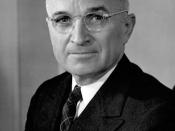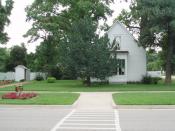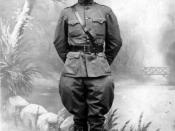Harry S. Truman
Harry S. Truman was born on a farm near Lamer, Mo., on May 8, 1884. During World War I, he served in France as a captain with the 129th Field Artillery. He married Bess Wallace in 1919. After engaging briefly and unsuccessfully in the haberdashery business in Kansas City, Mo., Truman entered local politics. Under the sponsorship of Thomas Pendergast, Democratic boss of Missouri, he held a number of local offices in a notoriously corrupt political area. In 1934, he was elected to the US Senate and reelected in 1940. During the second term he was appointed as head of a Senate committee to investigate war production and exposed his honest and hard working qualities and won widespread respect.
He was elected vice president in 1944, and became president after Roosevelt's sudden death in April of 1945 and faced the difficult problems of winding down the war with the Axis and preparing America for postwar struggles.
After Germany surrendered on May 8, Truman attended the Potsdam Conference in order to discuss settlement plans for postwar Europe. To end the war with Japan, Truman authorized the dropping of nuclear weapons on Hiroshima and Nagasaki on August 6 and August 9, 1945. Japan surrendered on August 14.
Between the years of 1947 and 48, two major civil-rights proposals were passed. The first one was the Truman Doctrine, passed in order to contain the spread of Communism, and the second was the Marshall Plan, passed to aid in the economic reconstruction of the war-savaged nations. Truman's distinguished hard work and honesty brought about his reelection in 1948 over heavily favored Thomas E. Dewey.
Truman's second term was primarily concerned with the Cold War with the Soviet Union, implementing the North Atlantic Pact, the United States police action in Korea,


